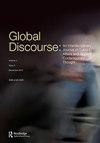Why do climate change negotiations stall? Scientific evidence and solutions for some structural problems
IF 1.4
Q2 INTERNATIONAL RELATIONS
引用次数: 10
Abstract
Climate change is perhaps the biggest challenge of our times. In order to cope with it, we have to organise action collectively. The most important way to cooperate globally is through United Nations negotiations, known as ‘conferences of the parties’. However, progress has been very slow, and disillusionment with the United Nations Framework Convention on Climate Change process has set in. From a scientific point of view, several obstacles surfacing in these negotiations have been well researched. Institutional analysis may provide suggestions or even solutions to some of these problems. Hence, we think that the United Nations Framework Convention on Climate Change negotiations could profit from scientific support. We provide scientific background for three prominent problems: how to reconcile different interests in a global public goods situation; how to ameliorate the consensus decision-making process; and how to design institutions to implement resolutions. Enhancing communication, trust and fairness, and enforcing sanctions, are suggested as key elements for that. Finally, we point to similar processes that have been brought to a successful end.为什么气候变化谈判停滞不前?一些结构问题的科学依据和解决方案
气候变化也许是我们这个时代最大的挑战。为了对付它,我们必须集体组织行动。全球合作最重要的方式是通过联合国谈判,即所谓的“缔约方会议”。然而,进展非常缓慢,对《联合国气候变化框架公约》进程的幻灭已经开始。从科学的角度来看,这些谈判中出现的一些障碍已经得到了很好的研究。制度分析可以为其中一些问题提供建议甚至解决方案。因此,我们认为《联合国气候变化框架公约》谈判可以从科学支持中获益。我们为三个突出问题提供了科学背景:如何在全球公共产品形势下调和不同利益;如何改进协商一致决策过程;以及如何设计机构来执行决议。加强沟通、信任和公平、执行制裁是其中的关键要素。最后,我们指出已经成功结束的类似进程。
本文章由计算机程序翻译,如有差异,请以英文原文为准。
求助全文
约1分钟内获得全文
求助全文
来源期刊

Global Discourse
Social Sciences-Political Science and International Relations
CiteScore
4.10
自引率
6.70%
发文量
64
期刊介绍:
Global Discourse is an interdisciplinary, problem-oriented journal of applied contemporary thought operating at the intersection of politics, international relations, sociology and social policy. The journal’s scope is broad, encouraging interrogation of current affairs with regard to core questions of distributive justice, wellbeing, cultural diversity, autonomy, sovereignty, security and recognition. All issues are themed and aimed at addressing pressing issues as they emerge.
 求助内容:
求助内容: 应助结果提醒方式:
应助结果提醒方式:


